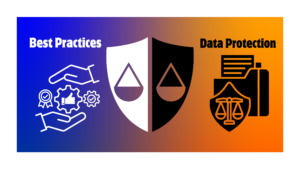Data security is a critical concern for all businesses in the digital age, but it's even more crucial for law firms. They handle sensitive client information daily, and if compromised, this data can have severe consequences. Law firm IT support is crucial and helps implement best practices.
Cyber threats are evolving, becoming more sophisticated and harder to detect. Due to their valuable data, law firms are attractive targets for cybercriminals.
This article aims to guide law firms in implementing robust data security practices. It provides actionable advice on cyber defense strategies, data protection, and digital security. Whether you're a law firm partner, an IT professional in the legal sector, or a compliance officer, this guide is for you.
By following these best practices, law firms can significantly reduce their risk of data breaches, ensuring client trust and business continuity.
Understanding the Importance of Data Security in Law Firms
Data security is not just a technical issue. It's a matter of professional responsibility for law firms, which handle a vast amount of sensitive data, including personal client information, case details, and financial records.
A breach of this data can lead to severe consequences, including reputational damage, financial loss, and potential legal action.
The importance of data security in law firms can be summarized like this:
- Maintaining client trust and confidentiality
- Avoiding legal and financial penalties
- Ensuring business continuity
- Upholding professional and ethical responsibilities
Common Cyber Threats to Legal Data
Law firms face various cyber threats, the most common of which are phishing, ransomware, and data breaches.
Phishing attacks: This tricks users into revealing sensitive information. They often come in the form of deceptive emails or websites.
Ransomware: This is a type of malicious software. It encrypts a victim's data and demands a ransom for its release.
Data breaches: Occurs when unauthorized individuals gain access to confidential data, which can happen through hacking, physical theft, or accidental disclosure.
Ethical and Legal Implications of Data Breaches
Data breaches can have serious ethical and legal implications for law firms. From an ethical perspective, lawyers have a duty to maintain client confidentiality. A data breach can violate this duty, damaging the attorney-client relationship.
Legally, law firms may face penalties for failing to protect client data, including fines, lawsuits, and regulatory action. A data breach can lead to a loss of client trust. This can have long-term impacts on a firm's reputation and business prospects.
Establishing a Strong Password Policy
Passwords are the first line of defense in data security, and a strong password policy is crucial for law firms.
This policy should include the following guidelines:
- Use complex passwords with a mix of letters, numbers, and special characters. Even better would be to use a passphrase consisting of a phrase that is easy for you to remember but is complicated enough to stop bad actors from guessing it.
- Avoid using personal information or common words in passwords.
- Change passwords regularly and avoid reusing old passwords.
- Use different passwords for different accounts.
- Consider using a password manager to store and manage passwords securely.
The Role of Encryption in Data Protection
Encryption is a key tool in data protection. It transforms data into a format that can only be read with a decryption key. For law firms, encryption can protect sensitive data in two ways. First, it secures data at rest, such as files stored on a computer or server. Second, it protects data in transit, such as emails or data transferred over a network.
By encrypting data, law firms can ensure that even if a breach occurs, the data remains unreadable to unauthorized individuals, adding an extra layer of security that helps maintain client confidentiality.
Regular Software Updates and Vulnerability Management
Keeping software up-to-date is a simple yet effective data security practice. Software updates often include patches for security vulnerabilities.
Law firms can protect themselves from known threats by regularly updating their software, including operating systems, applications, and security software.
Implementing Multi-Factor Authentication
Multi-factor authentication (MFA) adds an extra layer of security. It stops 99% of all attacks aimed at compromising online accounts. MFA requires users to provide two or more verification factors to gain access to a resource.
Implementing MFA can prevent unauthorized access for law firms even if a password is compromised. It's a powerful tool in the cybersecurity arsenal.
Conducting Security Audits and Risk Assessments
Security audits and risk assessments are crucial for law firms. They help identify potential vulnerabilities and areas for improvement.
An audit involves a thorough examination of the firm's security infrastructure. It checks for compliance with security policies and best practices.
Risk assessments, on the other hand, identify potential threats and their potential impact. They help firms prioritize their security efforts based on risk levels.
Employee Training and Awareness Programs
Employees are often the weakest link in a firm's security chain. Training and awareness programs can turn them into a strong defense line.
These programs should educate employees about common cyber threats and teach them how to respond to potential security incidents.
Regular training ensures employees stay updated on the latest threats and security practices. It's an investment that pays off in enhanced security for your firm and gives managing partners "peace of mind."
Developing an Incident Response Plan
An incident response plan is a must-have for every law firm. It outlines the steps to take when a security incident occurs.
The plan should include procedures for identifying and containing the incident. It should also detail how to eradicate the threat and recover from the incident.
Working with Law Firm IT Support & Cybersecurity Experts
Cybersecurity is a complex field that requires specialized knowledge. Law firms can benefit from working with cybersecurity experts. Choosing the right law firm IT support team is crucial. Not all are the same even though they may all look like they offer the same services.
These experts can help firms develop robust security strategies. They can also assist in responding to security incidents and ensuring compliance with data protection laws.
Law Firm IT Support Helping Ensure Compliance with Data Protection Laws
Compliance with data protection laws is crucial for law firms. These laws dictate how firms should handle and protect client data.
Non-compliance can lead to hefty fines and damage to the firm's reputation. Therefore, understanding and adhering to these laws is a key aspect of data security. Law firm IT support is beneficial especially for firms that want to focus on client growth.
Secure File Sharing and Communication
Secure file sharing and communication are vital for protecting sensitive data. Law firms often need to share confidential information with clients and other parties.
Using secure file-sharing services like Virtru and encrypted communication channels can help prevent unauthorized access to this information. It's a simple yet effective data security practice.
Managing Remote Work and Mobile Security
The rise of remote work has brought new challenges to data security. Law firms must ensure that their employees can access necessary resources securely from remote locations.
One solution is the use of Virtual Private Networks (VPNs). VPNs can provide secure remote access to firm resources and protect data in transit.
Mobile security is also crucial. Firms should implement mobile device management strategies to secure personal devices used for work.
Securing Physical and Digital Access
Physical security is as important as digital security. Unauthorized physical access to offices and data storage areas can lead to data breaches.
Firms should implement measures like access control systems and surveillance cameras. Additionally, digital access to sensitive data should be limited based on roles and responsibilities within the firm.
Data Backup and Disaster Recovery Strategies
They ensure that data can be restored in case of accidental deletion, hardware failure, or a cyber attack.
A robust disaster recovery plan is also essential. It should outline the steps to restore operations and recover data after a disaster.
The Importance of Cyber Insurance
Cyber insurance can help mitigate the financial risks associated with data breaches. It can cover costs like legal fees, notification costs, and even ransom payments.
However, it's not a substitute for good security practices. Firms should view it as a safety net, not a primary defense.
Conclusion: Maintaining a Culture of Security
In conclusion, securing law firm data is not a one-time task. It requires a continuous commitment to maintaining a culture of security.
Every member of the firm, from partners to interns, should understand the importance of data security. They should know the best practices and their role in implementing them. This collective effort can significantly enhance the firm's cyber defense and ensure the protection of sensitive client information.
Photo credit: Hire A Geek Online






You must be logged in to post a comment.